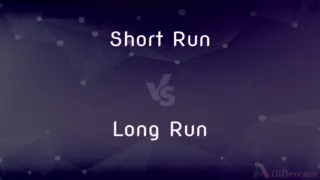Real Flow vs. Money Flow — What's the Difference?
By Tayyaba Rehman — Published on October 12, 2023
Real Flow refers to the movement of goods and services in an economy, while Money Flow denotes the monetary transactions for these goods and services.

Difference Between Real Flow and Money Flow
Table of Contents
ADVERTISEMENT
Key Differences
In economic terms, understanding the flow of resources is crucial. Real Flow is a key component, representing the transfer or exchange of physical goods and services in an economy. When we discuss the bartering of goods, the provision of services, or the physical aspects of the production process, we are delving into the realm of Real Flow. For instance, when a farmer sells crops to a supermarket, the movement of these crops is a part of Real Flow.
Money Flow, in stark contrast, signifies the financial or monetary side of these transactions. While Real Flow focuses on tangible exchanges, Money Flow revolves around the money used to facilitate such exchanges. In our earlier example, when the supermarket pays the farmer for the crops, this payment represents Money Flow.
To visualize the comprehensive economic cycle, imagine Real Flow and Money Flow as two sides of a coin. While Real Flow captures the essence of production, consumption, and the physical side of economic activities, Money Flow encapsulates the monetary transactions that make these activities possible. Both flows are intertwined, representing the cyclical nature of an economy where goods and services are exchanged for money, and vice versa.
In broader economic models, these flows are often depicted in circular diagrams to represent their continuous nature. Real Flow showcases how resources and finished products move through the production chain, while Money Flow demonstrates the financial side of these exchanges, emphasizing the interconnectedness of production, consumption, and monetary transactions.
Comparison Chart
Nature
Physical movement of goods and services.
Monetary transactions for goods and services.
ADVERTISEMENT
Represents
Production, consumption, and tangible exchanges.
Payments, investments, and financial aspects.
Example
Bartering of goods.
Payment for goods.
Key Focus
Goods, services, resources.
Money, payments, financial resources.
Dependency
Dependent on production and consumption.
Dependent on the value or price of goods and services.
Compare with Definitions
Real Flow
Represents the material aspects of production and consumption.
The economic model showcased the Real Flow of commodities in the market.
Money Flow
Monetary aspects of economic exchanges.
The central bank's policies greatly influence the Money Flow in an economy.
Real Flow
Physical exchange without involving monetary aspects.
Barter systems emphasize Real Flow by directly exchanging goods.
Money Flow
Payment side of economic transactions.
The digital revolution has modernized the way Money Flow operates in global markets.
Real Flow
Circulation of resources and final products.
The disruption in supply chains affected the Real Flow of products to retailers.
Money Flow
The flow of capital and monetary resources.
A surge in foreign investments boosted the Money Flow into the local market.
Real Flow
The movement of tangible goods and services in an economy.
The Real Flow between manufacturers and consumers has increased this quarter.
Money Flow
The financial transactions associated with goods and services.
Money Flow analytics help understand consumer spending habits.
Real Flow
The tangible side of economic activities.
Real Flow insights are essential for manufacturing planning.
Money Flow
Represents payments, investments, and financial resources.
Investors keep a close eye on Money Flow indicators for stock choices.
Common Curiosities
What is Real Flow?
Real Flow denotes the movement or exchange of tangible goods and services within an economy.
Is Real Flow only about physical goods?
No, it encompasses both physical goods and intangible services.
How do central banks influence Money Flow?
Through monetary policies, interest rates, and regulatory measures that affect borrowing, lending, and spending.
Is Real Flow a measure of an economy's productivity?
Partially, as it showcases the production and consumption aspects, but doesn't factor in the monetary value.
How do tariffs impact Money Flow?
Tariffs can affect Money Flow by altering import/export prices, influencing trade balances and currency values.
Can an economy sustain with a disrupted Real Flow?
A prolonged disruption in Real Flow can lead to production halts, affecting economic growth and stability.
How does Money Flow differ from Real Flow?
Money Flow relates to the monetary transactions for these goods and services, whereas Real Flow pertains to their physical movement.
How do digital payments affect Money Flow?
Digital payments streamline and speed up Money Flow, enhancing the efficiency of financial transactions.
Why is Money Flow important for an economy?
It represents the financial health and liquidity, indicating consumer spending, investments, and overall economic activity.
Can there be Real Flow without Money Flow?
Yes, in barter systems where goods are exchanged directly without using money.
Can Money Flow provide insights into consumer behavior?
Yes, analyzing Money Flow can give insights into spending habits, preferences, and economic sentiment.
Is Money Flow always a positive indicator?
Not necessarily. Rapid Money Flow without corresponding Real Flow (e.g., in speculative bubbles) can be problematic.
How do recessions affect Real Flow?
Recessions can lead to decreased production and consumption, negatively impacting Real Flow.
How interconnected are Real Flow and Money Flow in modern economies?
They are deeply intertwined, with disruptions in one often affecting the other, emphasizing the cyclical nature of economies.
Does Real Flow always correlate with economic growth?
Generally, a robust Real Flow indicates active production and consumption, suggesting economic growth. However, other factors can influence growth.
Share Your Discovery

Previous Comparison
Short Run vs. Long Run
Next Comparison
Veracity vs. AccuracyAuthor Spotlight
Written by
Tayyaba RehmanTayyaba Rehman is a distinguished writer, currently serving as a primary contributor to askdifference.com. As a researcher in semantics and etymology, Tayyaba's passion for the complexity of languages and their distinctions has found a perfect home on the platform. Tayyaba delves into the intricacies of language, distinguishing between commonly confused words and phrases, thereby providing clarity for readers worldwide.
















































